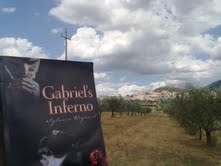Dear Everyone,
I just finished a fifteen day blog tour that was organized by KLB Virtual Events. I’d like to thank KLB, all the blogs that participated and especially my publisher, Omnific, for providing giveaways of “Gabriel’s Inferno” at every stop. And thank you, the readers, for reading the reviews and features and entering the contests. Congratulations to all the winners. (If you’d like to request a Kindlegraph, you can do so here.)
One of my readers suggested I explore the role of food in my novel. This suggestion prompted me to think about the role of food in society. For example, religious holidays as well as rites of passage are frequently celebrated with specific foods or feasts.
One can also think about the role of food in guest friendship and hospitality. When someone visits our home, one of the first things we do is to welcome them and to offer them a drink or something to eat. So to feed a guest is a way of welcoming him or her.
There is an excellent example of the importance of hospitality in the film version of Harper Lee’s “To Kill a Mockingbird.” In the film, there is a scene in which Scout, a young girl, scolds her schoolmate and lunch guest for “drowning his dinner in syrup.” The housekeeper, Calpurnia, calls her into the kitchen to point out that Walter is her company and as such, she will let him do whatever he wants at the table, including “eating the tablecloth.” To welcome someone into one’s home is to commit to being kind and hospitable – no matter what.
A rather different portrait of hospitality is found in the film “Babette’s Feast.” In this story, Babette cooks and serves an elaborate multi-course meal to her benefactors and their friends as a way of honouring their hospitality. When she fled to Denmark from the French civil war, two sisters took her in. Instead of returning to her native France, she chooses to stay with them and serve them as their cook.
The idea of hospitality and guest friendship is an old one. You can read about it in the Bible and in Greek and Roman works, for example. But Calpurnia’s simple observation that one’s company must be welcomed even when he or she displays dubious table manners, is an important one. Few people would insult a houseguest. But how many of us think it’s permissible to insult someone outside the home? Do the obligations of hospitality extend to the workplace, the Internet and social media?
As a sensualist, Professor Emerson is fixated on the pleasures of the body and this fixation extends to food and drink. The narrator notes that the Professor is impatient with mediocrity and so when he has the opportunity to take Julia to dinner, he chooses a very expensive steakhouse in downtown Toronto. On one level, the choice is all about him – he only eats steak at the finest restaurants. On another level, the choice is all about her – he feels remorse for having embarrassed her at her apartment and so he decides to buy her an extravagant meal to make up for it.
Can food really do such a thing? Can sharing a meal with someone be a means of apologizing or offering comfort?
There are several scenes in the novel in which Julia and Gabriel eat together and food has a slightly different role in each of them. I won’t spoil the story by listing all of them, but I’ll point out that you can glimpse some of Gabriel’s motivations by reflecting on the food (and drink) he chooses.
Many of you have been asking about the sequel to “Gabriel’s Inferno.” I’m encouraged by your support. I’m pleased to report that the sequel is progressing nicely, but I don’t have a release date yet. As soon as one is set, I’ll be able to announce it. Thanks for your patience.
Thank you also for suggesting “Gabriel’s Inferno” to your friends, relatives and Book Clubs. I’m consistently surprised and pleased at how the story is finding its audience through the kind words of readers who enjoyed it.
Today is the Feast day of St. Francis of Assisi. I have many reasons for admiring him and his mission, but today let me focus on the way in which Francis and his companions provided food and hospitality to the sick and the poor, even to the point of seeking out bandits in the wood in order to feed them. One of the finest examples of the mission of hospitality is St. Francis Table in the Parkdale neighbourhood of Toronto. The Franciscans and their volunteers serve the community with dignity, compassion and hospitality.
All the best and thanks for reading,
SR
PS. It’s said that the character of Dill in “To Kill a Mockingbird,” is said to have been based on Harper Lee’s childhood friend Truman Capote.


 I am honoured to have had all three of my novels appear on the New York Times and USA Today Bestseller lists. I was a Semifinalist for Best Author in the 2011 and 2012 Goodreads Choice Awards. {
I am honoured to have had all three of my novels appear on the New York Times and USA Today Bestseller lists. I was a Semifinalist for Best Author in the 2011 and 2012 Goodreads Choice Awards. {